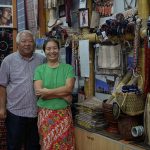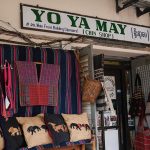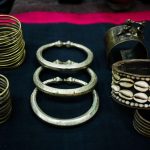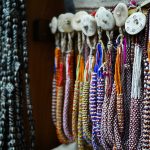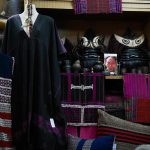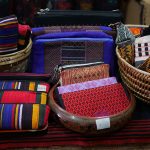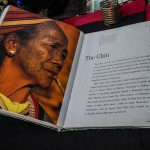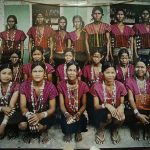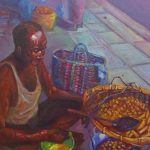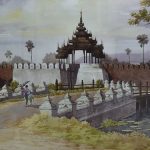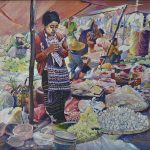The Irrawaddy Magazine |
- Deadline Approaches for Supreme Court Appeal in Koh Tao Murder Case
- Displaced Kachin Mothers Struggle to Feed Their Children
- Govt Spokesperson Denies Establishment of People’s Militias in Rakhine
- State Counselor Calls on Central, Private Banks to Collaborate
- Military Rejects Returning Yangon Stadium to the Public
- The Textured Lives of the Chin Hills
- Aung San Suu Kyi’s Free Press Dilemma
- Insein Artists Exhibit Their Work
- Detained Student Union Member Released on Bail
- Thai PM to Visit White House in October: Thai Foreign Minister
- Peace in Nagaland: Myanmar and India Both Have a Role to Play
- Questions Raised About $300 Million Downtown Development Project
| Deadline Approaches for Supreme Court Appeal in Koh Tao Murder Case Posted: 16 Aug 2017 08:36 AM PDT CHIANG MAI, Thailand – Five months after the District Court of Appeal in Koh Samui, Thailand, turned down an appeal for two Burmese migrant workers sentenced to death, the legal defense team for the pair are ready now to file an appeal to the Thai Supreme Court in Bangkok. Win Zaw Htun and Zaw Lin—both in their early 20s—were sentenced by the Koh Samui Township Court in Dec. 2015 for charges they have denied, involving the 2014 deaths of British nationals Hannah Witheridge, 23, and David Miller, 24, on Koh Tao island. The legal defense team—made up of members of the Thai Lawyer Council, legal advisers from the Myanmar government, and members of non-government organizations advocating for labor rights—would have to file the Supreme Court appeal no later than the Aug. 21 deadline. They have been preparing for the appeal since early March 2017 and have requested monthly extensions to complete the procedure. U Aung Myo Thant, a defense lawyer in the case, said they are likely to file the appeal on Friday. "If not, the appeal would be submitted next Monday, on the due date," he said. The defense team expects that once they submit this appeal, the Supreme Court ruling will come within a year's time. Win Zaw Htun and Zaw Lin are reportedly in good health and have met with family members and supporters at least twice since the last appeal application, according to the defense team's U Min Min, representing the Foundation for Education Development. "We are optimistic about the upcoming appeal and hope that it will not be dismissed this time, as we have more strong evidence for the case," U Min Min said. Their first appeal to the district court was submitted in 2016 and included nearly 200 pages of supporting documents, in which the defense team argued that the DNA evidence which led to the men's conviction was inadmissible, because it had not been collected or analyzed according to international standards. Lawyer U Aung Myo Thant said that while a death penalty conviction must be particularly solid, the allegations against the two migrant workers have brought up inconsistencies in the case and have led to a questioning of the evidence presented by the prosecution. The defense team is also preparing to file an appeal for a royal pardon from the Thai King Maha Vajiralongkorn, but whether they will need to submit it will depend on the results of the upcoming Supreme Court appeal. "If the two men are still in prison even after the appeal at the Thai Supreme court, we will have to file appeal for a pardon from the King of Thailand within a month," U Aung Myo Thant explained. Still, the lawyer said that they hope to win their case through legal efforts, as he insists that the two men in question "have no relation to the 2014 murders." The post Deadline Approaches for Supreme Court Appeal in Koh Tao Murder Case appeared first on The Irrawaddy. |
| Displaced Kachin Mothers Struggle to Feed Their Children Posted: 16 Aug 2017 08:16 AM PDT SADUNG, Kachin State — On a foggy evening, a few women trundled along the slope of a valley, grasping bundles of green leaves, and carrying their babies in slings on their backs. They entered a compound of dozens of bamboo homes roofed with blue tarpaulin, some displaying the UNHCR logo, in the backdrop of paddy fields lush with rain and leading to mountains. The women walked inside homes venting smoky waves, a sign that dinner was cooking in the camp for internally displaced people (IDPs). Based in Sadung town in Waingmaw Township, Kachin State, about 70 kilometers from the Kachin capital of Myitkyina, the camp was established with 408 people in early 2017. It was the result of renewed fighting between the Kachin Independence Army (KIA) and the Myanmar Army, or Tatmadaw, near Zai Awng camp, which forced thousands of IDPs to flee to Waingmaw and Myitkyina townships. Known locally as an area of displaced Lisu people, an ethnic minority of several hundreds of thousands living mostly in Kachin and Shan states, the residents of the camp often gather edible plants from nearby highlands, as international aid agencies in 2016 changed their ration schemes to provide cash rather than food.  The change has proved crippling for IDPs such as Daw Wo Mi, a Lisu mother-of-five who is fluent in Burmese, unlike most other people in the camp who only speak the Lisu language. "I cannot afford to cook meat for my children very often in one month. Our table is mostly decorated with a couple of side dishes," she said. Cash Rations According to the most recent UNHCR (United Nations High Commissioner for Refugees) estimation, nearly 100,000 IDPs have been sheltering for up to six years across Kachin State and along the border of neighboring Shan State since the collapse of a 17-year ceasefire agreement between the Tatmadaw and the KIA in 2011. IDPs make up 9 percent of jade-rich Kachin, and among this figure, 70 percent are women. Many of them—including residents of the Sadung camp—have little hope of returning home and reclaiming the lives they had before the conflict. From 2011 to early 2016, international aid agencies provided rice bags for Kachin IDPs, but in March 2016, the World Food Programme (WFP) replaced the food with cash, because of the refugee crises in the Middle East and "donor fatigue," according to Hka Li, the director of the humanitarian department in the Kachin Baptist Convention (KBC). U Thein Soe, committee member of Thagara IDP camp in Waingmaw Township, told The Irrawaddy that each beneficiary used to receive 13.5 kilograms of rice, two bottles of oil, salt and two cups of beans every month from 2011 to 2016. Now, each IDP is given 9,000 kyats (US$6.60) monthly, or, for those deemed the most vulnerable, 13,000 kyats ($9.53). Nang Shwe, a 23-year-old Shan mother of two who lives in Thagara camp, said, "We can't even buy meat for a few days a month. How can I pay for tuition fees for my children?" Not Enough Food The current aid package means most IDPs receive just 300 kyats per day ($0.22)—in the commercial capital of Yangon, this is not even enough to take a round trip journey on a public bus, and will barely cover the cost of a bind of watercress and roselle, the leaves of which can be fried or boiled in soup. During The Irrawaddy's recent visit to Kachin's IDP camps, Lisu, Shan and Kachin women spoke through the assistance of a translator of their financial hardships. Shan mother-of-two Nang Shwe said, "I cannot even give 100 kyats ($0.07) of pocket money to my child when he goes to school."  Daw Wo Mi, the Lisu mother, explained that her family of seven recently arrived at the camp and falls under the "most vulnerable" category, therefore receiving 91,000 kyats ($66.70) altogether every month from the WFP. She initially focused on buying low-grade rice bags of 50 kilograms instead of clothing for her family. A rice bag costs between 30,000-40,000 kyats ($22-29) in Sadung town and her family consumes at least two bags per month. She used the remaining 30,000 kyats on oil, salt, and other basic commodities. "I have to spend at least 4,000 kyats ($2.93) if I want to buy meat in the market, so vegetables are the main dishes on the table," she said. The children, she added, sometimes even refuse these dishes and eat only rice. Mother-of-three Daw Lang Yu, 44, who recently arrived at the camp on the compound of Lhavo Church in Waingmaw Township said, "We eat rice with salt when we have no money to go shopping."  Finding Work The struggle to put enough food on the table was a story that repeated itself in every camp The Irrawaddy visited in Waingmaw, Myitkyina, and Sadung towns. IDPs and aid workers told The Irrawaddy that the typical tasks of women in the camps include cooking, washing clothes, and parenting, while their husbands look for day labor in town, cutting bamboo or collecting firewood. Some women would leave the camps to seek recruitment on paddy farms, and some IDP camps located near urban areas see residents earning small amounts of money for selling crafts such as amber beads and necklaces in local markets. KBC humanitarian department director Hka Li said aid organizations give vocational training to IDPs as well as small grants for livelihood projects. International religious organizations occasionally give donations, he added. However, he conceded, "I suppose meals with meat would be very limited for IDPs." Local relief organizations reported that dire financial needs drive some young women to travel to China in order to find work; some marry Chinese men, and others are known to get trafficked, although the organizations said there is no systematic data available on trafficking cases among these populations. A lawyer in Waingmaw Township who asked for anonymity said IDP women have been working as prostitutes at an illegal casino near Bala Min Htin Bridge that is under the control of militia groups. The Irrawaddy could not verify this claim. KBC delegates told Daw Aung San Suu Kyi in Naypyitaw last month that addressing the food shortage of IDPs must be prioritized, Hka Li said, but it was undecided when the problem would be addressed. But mostly, the women in camps are burdened by the perpetual fear of more armed clashes—even more than cash or food concerns. Tatmadaw battalions, militias, and KIA Regiment No. 6, for instance, contest the area of Sadung. Daw Wo Mi, the Lisu mother of five, fled the fighting in 2011 and again in 2016. "I have no idea about politics, but we are always caught in the crossfire whenever they fight," she said.  The post Displaced Kachin Mothers Struggle to Feed Their Children appeared first on The Irrawaddy. |
| Govt Spokesperson Denies Establishment of People’s Militias in Rakhine Posted: 16 Aug 2017 07:24 AM PDT NAYPYITAW — Spokesperson from the Myanmar President's Office U Zaw Htay has denied that the government will establish people's militias in Rakhine State. "We are paying special attention to countering terrorism and the security of the local people. But speaking of the formation of people's militias, I want to make it clear that it is not the policy of the government," U Zaw Htay told The Irrawaddy. The National League for Democracy (NLD) government stated after taking office in 2016 that it had no plan to establish paramilitary forces in Rakhine State, the spokesperson added. There have been media reports, which quoted the chairman of Sittwe Township NLD chapter U San Shwe Kyaw, about a government plan to provide arms and military training to ethnic Arakanese Buddhists in the state's northern township of Maungdaw. According to U Zaw Htay, Myanmar Army troops have been conducting security operations in the Mayu mountain range in cooperation with border police, following talks between State Counselor Daw Aung San Suu Kyi and military leaders. Sittwe District NLD chairman U Thinn Kha Kyaw told The Irrawaddy that U San Shwe Kyaw's statement did not represent the party. "There are only three spokespersons for the NLD in Rakhine State—the chairman of the Rakhine State NLD, me and another one. U San Shwe Kyaw is not a spokesperson. We only knew about it after the media reported it. It is just his personal view," he said. On Sunday, Buddhist monks and locals took to the streets in 15 Rakhine State townships, demanding that the government provide greater security and arm local Buddhists, citing a fear of Muslim militants. The Irrawaddy was not able to obtain a comment from Rakhine State chief minister U Nyi Pu and spokesperson of the Rakhine State government U Min Aung on Wednesday. Members of the Arakan National Party (ANP), which holds the majority of seats in the Rakhine State parliament, made the suggestion during a meeting with Myanmar Army Commander-in-Chief Snr-Gen Min Aung Hlaing last week to arm Arakanese youth, but the army chief did not give a clear answer. Translated from Burmese by Thet Ko Ko The post Govt Spokesperson Denies Establishment of People's Militias in Rakhine appeared first on The Irrawaddy. |
| State Counselor Calls on Central, Private Banks to Collaborate Posted: 16 Aug 2017 05:16 AM PDT YANGON — State Counselor Daw Aung San Su Kyi held a meeting in Naypyitaw on Tuesday at her office with members of the country's Central Bank and delegates from the government's economic committee concerning the development of Myanmar's banking sector. Bankers who attended the two-hour meeting told The Irrawaddy that Daw Aung San Suu Kyi advocated for collaboration and regular meetings between private bankers and the Central Bank of Myanmar in order to improve the banking sector. In what was their first meeting with the State Counselor, private bankers presented information pertaining to the functioning of local banks under the rules and regulations of the Central Bank. "The Central Bank's policy is very important in improving the banking sector. The bankers presented some obstacles in the current banking system related to working under existing Central Bank regulations," U Thaung Han, CEO of the Myanmar Citizens Bank, told The Irrawaddy on Tuesday. "We are glad to have the chance to present our situation and our needs. She [Daw Aung San Suu Kyi] met with the chairs of private banks for the first time. It was a spark of positive change in the banking sector," he added. Chair of the Global Treasure Bank U Maung Maung Thein said Daw Aung San Suu Kyi called on bankers to invest in other "important, essential sectors" in the country. The Central Bank underwent staffing changes in the first week of August, welcoming new deputy governors and members. U Ye Min Oo, a member of the National League for Democracy government's economic committee, said the Central Bank has an important role in changing the banking system. "It also needs to review and assess the output of the Central Bank's governors after three to six months," he explained. The Central Bank of Myanmar sets the rules and regulations for local private banks, such as minimum interest rates for loans, limits to extending loans exceeding 25 percent of authorized capital, and conducting special audit programs. The post State Counselor Calls on Central, Private Banks to Collaborate appeared first on The Irrawaddy. |
| Military Rejects Returning Yangon Stadium to the Public Posted: 16 Aug 2017 05:07 AM PDT YANGON — Myanmar's military said it has no intention to return a 13-acre sports ground and stadium in Yangon's Hlaing Township to the public, when replying to a lawmaker's question in Parliament on Wednesday. U Aung Kyaw Kyaw Oo, a Lower House lawmaker representing Hlaing Constituency, asked whether there was a plan to give the property back to Hlaing Township residents during the parliamentary session. Deputy Defense Minister Maj-Gen Myint Nwe replied that the [former] Ministry of Construction transferred the 13.754 acres of land including the stadium to the Ministry of Defense on July 30, 1991. "Now, it is the only stadium used for trainings and competitions of the regiments and corps under Yangon Region Military Command. So, we can't give it up back," he said. The Deputy Defense Minister added that athletic training was being held for military members there with the intention of winning international sporting titles for the country. The department of Sports and Physical Education under the Ministry of Sports constructed a sports ground and stadium for residents in 1969 when Myanmar hosted the fifth Southeast Asian Peninsular Games. The venue later held soccer matches between wards, townships, and schools in Yangon, as well as other sporting competitions and annual festivals. The lawmaker claimed that the township had brought up seven elite national soccer athletes and one weightlifter in the past. He said the military grabbed the stadium after security operations took the venue during the 1988 pro-democracy uprising against the then authoritarian rulers. It then leased the grounds to the Yangon United soccer club. "A stadium is necessary for Hlaing. I would like to ask [the military] to give us other unused land in the township in order to build another stadium," lawmaker U Aung Kyaw Kyaw Oo said. The deputy defense minister said the military would take this into consideration if there were a request from the Ministry of Health and Sports for the unused plot in line with land requirements. He added that there are only 13 township stadiums in Yangon's 45 townships. U Aung Kyaw Kyaw Oo told The Irrawaddy that he would ask the Ministry of Health and Sports to obtain land for a stadium for the township. "It is no surprise that the military won't return it. I expected that. But there is a large area of land that they own in our township that has gone unused. I will try to get them to give this as a substitute," he said. The post Military Rejects Returning Yangon Stadium to the Public appeared first on The Irrawaddy. |
| The Textured Lives of the Chin Hills Posted: 16 Aug 2017 04:15 AM PDT The Irrawaddy revisits this story from June 2015 about Khun Shwe and her husband Kyin Lam Mang, who have become advocates for traditional Chin crafts. YANGON — At a sideways glance, Yo Ya May seems less a textile shop than a museum. Sitting on the first floor of Yangon's bustling Bogyoke Market, cofounders Khun Shwe and her husband Kyin Lam Mang clearly feel blessed by their success, and in the course of their lives become the city's most eager advocates for traditional Chin craft. Their store is an undeniable labor of love. "My children tell me, 'you are really absorbed in this job. Your soul will stay circling around the shop after you die,'" Khun Shwe told The Irrawaddy. Founded in the 1990s, Yo Ya May has been based at the tourist hotspot since 2003, garnering praise from Lonely Planet and enjoying the dividend from the tourist boom of recent years. Both 56-year-old Khun Shwe and her husband hail from Tedim Township in northern Chin State, and walking into their store is a window into their world. Sitting by hand-woven dresses and fabrics are photos of women in tribal dress and a library's worth of books on ethnic weaving styles, techniques and fashions. For the women behind Yo Ya May's wares, there are no worthier ambassadors than the store's owners. "We started this as a family business," Khun Shwe said. "We continued with pride because with our work we are able to support Chin women as well." The mother of seven children herself, Khun Shwe said that most Chin women don't get the chance to have a formal education, with many villages in the remote mountainous state lacking even primary schools, and with most parents unwilling to send them away for their studies. In many of Chin State's most isolated communities, the women instead devote all of their efforts to craft. "They pour all of their creativity and imagination into their weaving, that becomes their masters degree," she said. When the business started, their stock came exclusively from the work of three elderly women from the southern Chin State township of Paletwa. Each weaved in keeping with the traditions of the Khami ethnic group, which according to Khun Shwe is the most complicated in design and technique of all local Chin styles. As demand grew with the years, Yo Ya May has expanded to take work from members of the ethnic Chin community living in Sagaing Division and Arakan State—some of whom are also trained in Naga craftsmanship—and have begun to stock the work of Kachin and Karen women. Around 100 women in all are now working for the store. Cheery Zahau, a Chin women's rights activist who will be contesting this year's general election, told The Irrawaddy that Chin textiles are becoming more popular with higher tourist numbers, reinvigorating traditions that have until recent years been quarantined by the isolation of one of the country's least developed communities. "The larger the market is, the better for Chin women," she said. "These women will have more income and they will be encourage to preserve their culture." With a vast collection of vintage materials, Khun Shwe said she would like to open a museum in the future dedicated to promoting Chin culture. With most of her trade dependent on foreign buyers, she believes that more should be done to foster a local appreciation of ethnic traditions. "It is rare for local people to come to our shops," she said. "Only foreigners buy souvenirs here. It would be better more locals knew the true value of these products." The post The Textured Lives of the Chin Hills appeared first on The Irrawaddy. |
| Aung San Suu Kyi’s Free Press Dilemma Posted: 16 Aug 2017 03:18 AM PDT Aung San Suu Kyi is treating the press in Myanmar poorly, and that may impede her efforts to democratize the conflict-wrought country. But is Suu Kyi's apparent authoritarian streak mere caution? Expanding civil liberties too forcefully could bait the former junta into retaking full control of the Southeast Asian nation, setting back the cause of liberty and democracy. Prior to becoming Myanmar's State Counselor—the de-facto head of government—Suu Kyi was considered a hero among Western democrats due to her role as a leader during the 1988 uprisings against the military-run government, which resulted in her being placed under house arrest repeatedly from 1989 until 2010. In 1991, she won the Nobel Peace prize for her efforts. Now, however, that image has been sullied. Human rights advocates and journalists are alarmed by her treatment of the media and fear the erosion of gains in freedom of speech. As Reuters reported last week, she is calling on the nation to follow state-run news reports about government activities and keeping independent media at a distance. Foreign media are given more access her than the domestic press, but their movement in conflict zones is still sharply limited. Suu Kyi's security detail has even physically prevented foreign reporters from asking her questions. "Despite hopes a Suu Kyi-led government would improve press freedom conditions in Myanmar, the situation for reporters has not materially improved over the previous military and military-backed regimes," says Shawn Crispin, the Committee to Protect Journalist's Southeast Asia senior representative. "It's been eye-opening for anyone who remembers her as a pro-democracy icon standing up to military power." In 2013 Myanmar's legislature enacted the Telecommunications Law, the most controversial aspect of which is arguably the broadly-written section 66d. Under 66d, anyone can press charges over internet, telephone, radio and television content, regardless of whether or not he or she is the subject of the content. The maximum prison sentence for being convicted on 66d charges is three years, though fines may also be imposed. According to the free speech advocacy organization PEN Myanmar, at least 80 cases invoking 66d have been filed since the law passed; 73 of those occurred since Suu Kyi came to power in 2016. While even some members of the media have invoked 66d, it has also been used by members and supporters of the National League for Democracy, Suu Kyi's political party. Some of the law's victims were prosecuted, and served months in prison, for making controversial comments about Suu Kyi. There are small signs that Suu Kyi's party is beginning to reform media law. The upper house of Myanmar's Assembly, with the NLD now in the majority, approved amendments to 66d in August that would prevent third parties from pressing charges without permission from the aggrieved individual, and make it easier for defendants to obtain bail. A proposal to abolish 66d entirely, however, stalled. It's not clear what role Suu Kyi played in trying to advance the legislation, though she was certainly involved. Then there's the Unlawful Associations Act's section 17(1), in which even covering an event can land a journalist in jail if the government disapproves of a person or group present. While the act has been on the books since 1908, it's still wreaking havoc under Suu Kyi's pro-democracy government. Earlier this month, three journalists were denied bail after they were detained under the Unlawful Associations Act for covering a ceremony organized by the Ta'ang National Liberation Army, the armed wing of a rebel group based in Myanmar's northeastern Shan State, in June. Suu Kyi herself doesn't speak in direct opposition to these laws and the fallout from them, opting instead to talk in broad terms about potentially changing them. Perhaps that's because of the fragility of her country's first steps towards democracy and constitutional liberty. The Burmese military has 25 percent of seats in the legislature and it could retake power under an emergency clause in the Constitution, which requires over 75 percent approval in the legislature to be modified. So legislators from the military can undo any progress if they think reformers have gone too far. "The military clearly sees journalists attempting to faithfully cover stories within conflict zones and disseminate them in online media as a potential threat to national security," writes John Dale, an associate sociology professor at George Mason University and an expert on development and human rights in Myanmar, in an email. Journalism advocates also note, however, that Suu Kyi often refrains from speaking to the Burmese press, choosing to speak only to international news outlets on occasion. "As far as I can recall, since the election she has only done press conferences inside Myanmar when foreign dignitaries have been visiting, and she has taken a very limited number of questions," says Thomas Kean, editor in chief of the independent publication Frontier Myanmar. "She seems to see little need to engage with journalists on a day-to-day basis." That may be partly just because Suu Kyi does not have strong historical relationships with the local independent media. During Suu Kyi's house arrest, "there was little local media beyond the government newspapers and journals and they were very hostile toward her, even extremely rude," says Priscilla Clapp, the Chief of Mission to the US Embassy in then-Burma from 1999-2002 (the US didn't have an ambassador then due to strained relations). "There is now a plethora of newspapers and journals, many with their own agendas, and I can imagine that it would be very difficult and politically tricky for her to choose which outlets to grant interviews without causing a great political uproar." But some of her actions cannot be given such benign explanations. Her own office seems to have taken a page out of President Donald Trump's playbook by dismissing reports about her and about clashes between the military and ethnic minorities as fake, fabricated and false. Suu Kyi spokesperson Zaw Htay did not respond to a request for comment about complaints from media and activist groups. "I think now she and her government don't want to confront…the military," emailed Nai Kasauh Mon, editor-in-chief of Mon News Agency, a non-profit news outlet that reports on the Mon ethnic community, and spokesperson for Burma News International, an association of 13 independent news outlets reporting on Myanmar. "While they fought for democracy, they were not afraid," he adds. "But now they are afraid to lose their power." Call it the Catch-22 of democracy promotion. Alex Lazar is a reporter in Washington, DC covering defense and military issues. The opinions expressed here are his own. This article originally appeared in Reuters. The post Aung San Suu Kyi's Free Press Dilemma appeared first on The Irrawaddy. |
| Insein Artists Exhibit Their Work Posted: 16 Aug 2017 03:09 AM PDT YANGON — The annual group exhibition of Insein Township artists features Yangon cityscapes, as well as culturally significant places and ethnic people from across the country. Artist Moe Thura talked about his painting, which depicts Pansodan Road's second-hand book vendors. "Mostly I paint everyday life—scenes from my daily life. I often go to second-hand book markets. I like the place, the atmosphere. So I put it on canvas." One of artist Triangle Tun Naing's works is a wild flower in full bloom on a sunny day. He said he saw the flower by the roadside in southern Shan State. "This is about freedom—a flower in the wild and in the wind. So, I didn't even frame this painting," he said. Modernist Nyi Tun features a nude series focused on mass and density. He said most of his paintings showcased at the exhibition were drawn from female art models. There are more than 50 paintings from 16 artists priced between US$100 and $1,200, showcased until Sunday at Myanmar Traditional Artists and Artisans Organization (Central) in Bogyoke Aung San Market in Yangon. Translated from Burmese by Thet Ko Ko. The post Insein Artists Exhibit Their Work appeared first on The Irrawaddy. |
| Detained Student Union Member Released on Bail Posted: 16 Aug 2017 01:24 AM PDT MANDALAY — A court in Taungoo Township, Bago Region, released a detained student union member on bail on Tuesday. Ko Aung Htet, a former member of the Student Union of Taungoo, was detained at Taungoo Prison in early August and faces trial under Article 505(b) of Burma's Penal Code. "My lawyers asked the court for bail, as I need proper medical treatment. They stated that my life would be at risk if I had to wait for my trial inside a prison," said Ko Aung Htet. "The court released me on bail. Everyone was surprised. I have to thank the court for considering my health. While in prison, Ko Aung Htet was attacked by an inmate a few days into his detention and suffered an injury to his head. Ko Aung Htet believes that he was attacked because the other inmate wanted to be transferred to another facility. He will seek treatment at Yangon General Hospital now that he has been released on bail. The inmate who attacked Ko Aung Htet was charged under prison law and is currently detained in an isolation cell. Ko Aung Htet, along with another former Student Union member Ko Victor, was sued by a local lieutenant colonel of the Myanmar Army's Southern Command for traditional Thangyat songs, which they composed and sang during Thingyan Water festival in Taungoo in April. The songs advocated for the amendment of the military-drafted 2008 Constitution. The two men are facing a lawsuit for incitement under Article 505(b), which is punishable by a maximum of two years imprisonment, a fine, or both. The article generally does not allow the accused persons to be released on bail. "It is because we used a graphic picture of the Constitution in flames on our parade car and our shirts," said Ko Aung Htet. "Accusing us under 505(b) shows that the army is still afraid of the abolishment or the amendment of the Constitution. We will take any risk to push for its amendment," he added. The next court hearing for Ko Aung Htet is set for August 29. Ko Victor is still on an arrest warrant. The post Detained Student Union Member Released on Bail appeared first on The Irrawaddy. |
| Thai PM to Visit White House in October: Thai Foreign Minister Posted: 15 Aug 2017 11:20 PM PDT BANGKOK — Thailand's prime minister and junta chief Prayuth Chan-ocha will visit the White House in October, Thailand's foreign minister said on Tuesday, adding trade and security would be on the agenda, the latest sign of warming ties between Bangkok and Washington. Last week US Secretary of State Rex Tillerson paid a visit to Thailand—the highest level visit by a US official since the military took power in a 2014 coup. Tillerson's trip and Prayuth's invitation from US President Donald Trump to visit the White House are the latest sign that Bangkok and Washington are re-establishing normal diplomatic relations following the coup. "There will be discussions with President Trump about trade, investment, military security and the regional situation which is a big issue," Thai foreign minister Don Pramudwinai told reporters. The Thai government had previously said the visit would take place in July. A spokesman for the US Embassy in Bangkok said he had no new information on Prayuth's visit to the White House, which follows an invitation extended by Trump to Prayuth during an April telephone call between the two. "We look forward to the Prime Minister's visit to Washington, DC. We continue to seek a mutually agreeable day for the prime minister's visit to the White House," spokesman Steve Castonguay told Reuters. Tillerson's priority has been urging Southeast Asian countries to do more to cut funding streams for North Korea as tensions mount between the United States and North Korea. The United States has said it believes North Korean front companies are active in Thailand and is trying to encourage the Thais to shut them down. Tillerson, however, made no public comment on North Korean firms during his 5-hour stay in Bangkok where he met with Prayuth. Don said the issue was not specifically raised during Tillerson's visit. "The United States has not pressured Thailand to shut North Korea business," Don said. "The secretary's visit discussed broad issues." The post Thai PM to Visit White House in October: Thai Foreign Minister appeared first on The Irrawaddy. |
| Peace in Nagaland: Myanmar and India Both Have a Role to Play Posted: 15 Aug 2017 07:25 PM PDT There is much talk and speculation about a new solution to ongoing peace negotiations between the Indian government and the National Socialist Council of Nagaland—Isak Muivah faction (NSCN-IM). There is also an emerging belief among many Naga that a solution to the decades-old conflict may be just around the corner—sentiments held by Naga residents on both the Indian and the Myanmar sides of the border. This expression of hope—as auspicious at it may seem—coincides with some recent significant developments in the history of the Naga struggle for repossession of its homeland. The Naga—under the aegis of the Government of the Peoples' Republic of Naglan (Nagalim) (GPRN)—celebrated their independence day on August 14 at Hebron near Dimapur in Nagaland, a day ahead of India's own national Independence Day. Monday also marked a year since the joint announcement made by NSCN-IM general secretary Thuingaleng Muivah and the government of India interlocutor R.N. Ravi that both sides were getting closer to a "final settlement." The joint statement issued on August 13 last year said: "We assure the people that the talks have been progressing in the right direction with determination. We are closer than ever before to the final settlement and hope to conclude it sooner rather than later." A ceasefire agreement was signed between the NSCN-IM and the government of India in 1997 and since then there have been more than 80 rounds of talks paving the way for a "framework agreement," that was signed in August last year. Very recently, V.S. Atem—member of the collective leadership of NSCN-IM—is said to have told a visiting Naga delegation from Myanmar that a "solution will arrive soon." Meanwhile in Myanmar, the National Socialist Council of Nagland-Khaplang (NSCN-K) has, for the first time, made its position clear on the nationwide ceasefire agreement (NCA) that frames the Myanmar peace process. Leaders of the NSCN-K told the Myanmar government the group is willing to sign the NCA if it covers all Naga including those living across the international boundary with India. The NSCN-K has, in fact, proposed a tripartite dialogue, involving India, Myanmar and the Naga, to find a solution for peace. Recently, the NSCN-IM General Secretary Muivah also reiterated the call for the "integration of all Naga territories." He was quoted in a report in Indian news site FIRSTPOST as saying: "The historic 'Framework of Agreement' recognizes the unique history, the identity, the sovereignty, the territories of the Naga. It also recognizes the legitimate right of the Naga to the integration of all Naga territories." The backdrop of all this—and what perhaps assumes great significance—is the call for a tripartite dialogue involving the government of India, Myanmar and the various Naga groups on both sides of the geographical divide. Most Naga in Myanmar feel this is the best way forward as they don't believe the country's NCA addresses their needs. They desire an alternative platform that addresses the key issue of Naga Homeland, according to Muivah. Similar views were expressed by Athong Makury, the president of the Council of Naga Affairs, in a recent interview. According to Makury: "Tripartite dialogue is a must in order to solve this conflict. We are also observing the situation on both sides. There are many capable people who can lead this. Also, India as a big nation with a long history of democracy should take initiative on this. It is an opportunity for India." Young leaders like Makury certainly see merit in a joint dialogue involving all the different stakeholders, as they feel that a peace process only involving the Government of India and the NSCN-IM is not sufficient. Though he is confident that "uncle" Muivah will not give up on the sovereignty issue, he is also wary of the lack of transparency of the agreement. He sees no logic in a Naga solution if it's one-sided—meaning without taking into account the larger aspirations of all Naga. "If they are going to solve the conflict in accordance with imaginary boundary lines, it will be a fatal blunder," Makury cautioned. Displays of optimism among Naga residents on both sides of the border are rarely felt, perhaps because most Naga view the peace process with much skepticism and the content of the framework agreement between New Delhi and NSCN-IM is still unknown. Even if the framework agreement is made known, will it answer questions regarding the integration of Naga-inhabited areas in Arunachal Pradesh, Assam, Manipur in India and some areas of Myanmar—areas considered to be the rightful homeland of the Naga? Local ethnic groups of states bordering Nagaland in India have vehemently opposed the idea of a Greater Nagaland by incorporating the Naga-inhabited areas of those states. The pre-conditions put forth by NSCN-K to sign the NCA certainly give the Naga homeland issue a new dimension. The NSCN-K has been fighting with the Indian government but it has rarely come to blows with the Myanmar Army. A bilateral agreement between Myanmar's government and the NSCN-K signed in 2012 allows the outfit to keep arms and to freely move unarmed personnel within Myanmar. The organization was allowed designated military camps in the Naga Self-Administered Zone, which includes Lahe, Leshi, and Namyun townships in Sagaing Division. Even though the chance of a conflict with the Myanmar military is remote, the issue of territorial integrity for the Naga is supremely important, and declared widely on social media. The eastern Naga hold on to their history and text "rejecting the division of the Naga homelands" in the Anglo-Burmese Yandabo Treaty of 1826, and later in 1953 under the India-Myanmar demarcation of Naga territory by prime ministers Pandit Jawaharlal Nehru and U Nu. Like most ethnic armed organizations in Myanmar, the Naga opposed the country's military-drafted 2008 Constitution, which they claimed "badly damaged and sliced" Naga territories into pieces. A Facebook post by the Naga in Myanmar (Eastern Naga) states: "The hill townships, Lahe, Leshi, and Namyun, were given as a Naga Self-Administered Region but not Hkamti, Homalin and Tamu townships, which now fall under Sagaing Division. This was done by the junta without the consent of the Naga public. The military knew it belonged to the Naga but intentionally annexed major parts of the Naga territory into their fold. It is a deliberate human rights violation [against] the Naga!" The issue of integration of Naga-inhabited areas has proven to be extremely sensitive on the Indian side of the border and could throw up similar challenges on the Myanmar side. It is hard to forget the June 2001 violence in Manipur's Imphal Valley, in which protests and riots broke out over an extension to a ceasefire between the government and Naga forces. It remains to be seen how the concept of "shared sovereignty" plays out in reality. On August 14, 2015, speaking at Hebron, Muivah claimed that it was "clearly stated in the agreement that both sides respect the people's wishes for sharing sovereignty," adding that, "We have to work out to what extent to share our rights to sovereignty." On the Myanmar side of the Naga story, the big question is whether the same concept of a shared sovereignty applies to the tripartite dialogue—if and when it happens. It may be too early to comment, but recent developments in the Indian government's framework agreement—which is expected to provide a possible solution—and the call for a tripartite dialogue by the NSCN-K certainly are certainly positive steps going forward. Bidhayak Das is a veteran journalist who has also spent more than a decade working on promoting democracy in Myanmar. He is currently working as an independent consultant on elections, media and communications. The post Peace in Nagaland: Myanmar and India Both Have a Role to Play appeared first on The Irrawaddy. |
| Questions Raised About $300 Million Downtown Development Project Posted: 15 Aug 2017 06:46 PM PDT YANGON — Land clearing and demolition for a project worth more than US$300 million on the former site of a Defense Services Museum, near Shwedagon Pagoda, has prompted a lawmaker to inquire about the initiative in the upcoming parliamentary session. U Kyaw Zay Ya, a Yangon regional lawmaker representing Dagon Township—where the site is located—told The Irrawaddy that the scale of the project on a nine-acre plot of land attracted his attention. The lawmaker said that in the upcoming legislative session on Aug. 31, he would ask the government about the project details, which have not yet been made public. The project is the first such undertaking granted permission for investment under the new Myanmar Investment Law. He also pointed out that some of his constituents were unhappy with the new project, which includes the construction of a hotel on the site where Jubilee Hall, once a landmark in country's struggle for independence from British colonial rule, was located. In the 1970s, the historic building was demolished to make way for the Defense Services Museum, which has since moved to Naypyitaw. In 2011, the government announced plans to privatize land in Yangon, including state-owned colonial heritage buildings and military-owned land. Most of the areas were handed over to well-connected companies, while critics pointed to a lack of transparency in the selection and leasing processes. The Irrawaddy has learned that the development project at the former Defense Services Museum was first approved under previous U Thein Sein-led government. The local Ayeyar Hinthar Holdings Co. Ltd. initially won the tender announced in December 2011, for developing and operating a hotel, offices and service apartment, and a shopping mall. Ko Ne Ne Hlwam Moe, vice chairman of Ayeyar Hinthar, told The Irrawaddy on Tuesday that the company signed a leasing contract in 2013 with the government for 50-year terms with two 10-year extensions. "Since 2013 we have been paying annual land use fees of US$2 million to the government," he added. But according to written correspondence seen by The Irrawaddy from the Yangon Region government to the company in January this year, the owner of the land in question is mentioned as the Ministry of Defense. Later, the company partnered with the Japanese companies Fujita Corporation, Tokyo Tatemono Co. Ltd, and Japan Overseas Infrastructure Investment Corporation for Transport & Urban Development (JOIN). The Myanmar Investment Commission granted investment permission for the joint venture in May 2017. Under the joint venture, they will develop a nine-floor five star hotel operated by Japan's Hotel Okura Co. Ltd., as well as offices and commercial facilities.  The total cost of the project is expected to reach $332.5 million, with construction to start at the end of 2017 and be completed by 2020, according to the vice chairman of Ayeyar Hinthar. "It is a more than a $300 million investment in Myanmar. A nice project will be developed in this place. Many job opportunities will come and the government will get around $170 million in profits from leasing," Ko Ne Ne Hlwam Moe said. He said they are now doing a traffic impact assessment, as the Yangon City Development Committee is curious about how the project will impact the gridlock of the city. The post Questions Raised About $300 Million Downtown Development Project appeared first on The Irrawaddy. |
| You are subscribed to email updates from The Irrawaddy. To stop receiving these emails, you may unsubscribe now. | Email delivery powered by Google |
| Google Inc., 1600 Amphitheatre Parkway, Mountain View, CA 94043, United States | |

